Vitamin B12 : Vitamin B12 is one of the important vitamins that is needed for…
Top 10 Indian Foods Rich In Vitamin B9
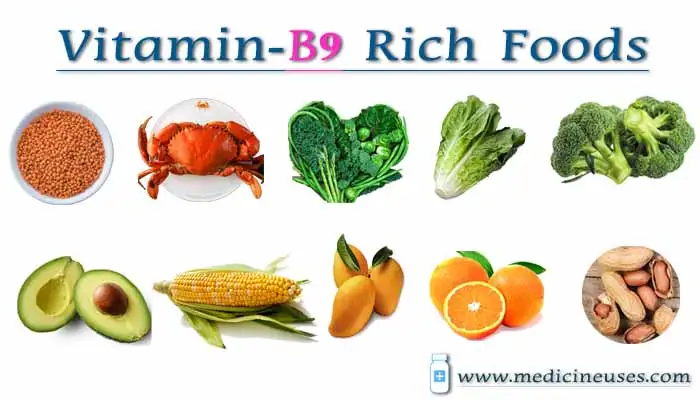
Vitamin B9 :
Vitamin B9 is a water-soluble vitamin that is essential for your body. It is also known as folate, vitamin B9, or folic acid. This Vitamin B9 is necessary for the production of DNA and RNA and helps in the formation of red blood cells. It also helps in the metabolism of protein, fats, and carbohydrates. Vitamin B9 is an important factor for pregnant women because it helps to prevent birth defects such as spinal cord defects or neural tube defects in infants.
- Folate is a B vitamin found in many foods. The manmade form of folate is called folic acid
- Folate is also known as folacin and Vitamin B9
- Vitamin B9 is water-soluble and is naturally found in small amounts in many foods
- It is also sold as a supplement in the form of folic acid
- Supplement form is better absorbed than that from food sources
- Folate helps to form DNA and RNA and is involved in protein metabolism
- Folate is also needed to produce healthy red blood cells
- It reduces the risk of birth defects called neural tube defects, such as spina bifida, in unborn babies
- It helps during pregnancy and for the development of fetal
- Regular intake of folic acid has shown to reduce homocysteine levels in the blood
- Vitamin B9 intake shows a marked reduction of heart blocks and strokes
- Vitamin B9 plays a pivotal role in improving the cognitive functioning of the brain
- Vitamin B9 intake can also help in improving bone strength
- Vitamin B9 helps to reduce more varieties of cancer
- It Reduces kidney and liver damage and promotes fertility
- It helps Treating arsenic poisoning and autism spectrum disorders
- It helps in boosting a healthy immune system
- Folate-deficiency causes anemia in pregnancy
- Deficiency leads too extreme tiredness, a lack of energy, pins and needles (paraesthesia), sore and red tongue, mouth ulcers and disturbed vision
- Less Vitamin b9 leads to depression and confusion too
- Daily we need 200 micrograms DFE of Vitamin B9
- During pregnancy it is recommended to take folate 400 mcg and even before that women can add folate in their diet
Ten Important Indian Foods Which is Rich in Vitamin B9
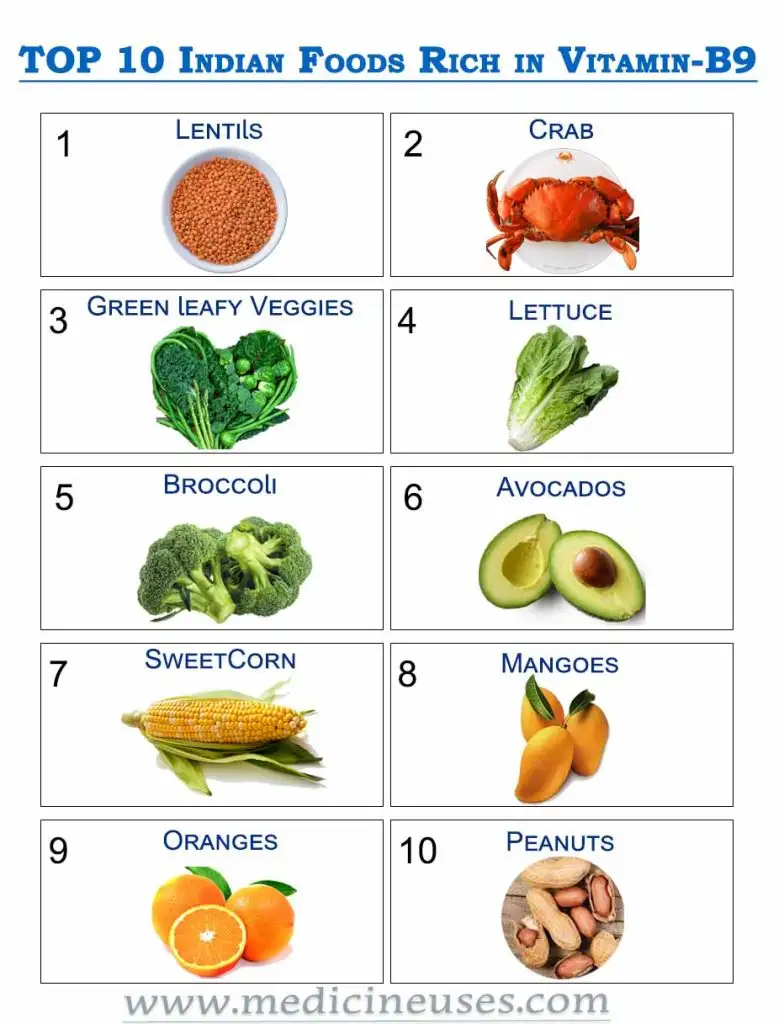
| 1 Lentils | 2 Crab |
| 3 Green leafy vegetables | 4 Lettuce |
| 5 Broccoli | 6 Avocados |
| 7 SweetCorn | 8 Mangoes |
| 9 Oranges | 10 Peanuts |
1. Lentils :
- Lentils are low in calories and high in nutrition
- They help to reduce blood cholesterol because of its high content of soluble fiber, and hence reduces heart disease
- It has a great source of folate and magnesium, good for heart health
- It helps to prevent constipation and other digestive disorders like irritable bowel syndrome and diverticulosis
- It stabilizes blood sugar levels and provides a steady energy throughout
- Lentils contain the third-highest levels of protein in it
- Lentils are also a good source of iron, which transports oxygen throughout your body and is key to energy production and metabolism
- It also helps in weight reduction, low in calories and contain virtually no fat
- Lentils provide a large amount of folate
- 100 grams Lentils provides 78 % DV of Folate that we need everyday
2. Crab :
- Crab is a major source of protein
- The protein in crab is high in quality, because of a lack of connective tissue, easy digestible for people of all ages
- It is rich in vitamins and minerals
- Meat of crab is also low in fat and contains Omega-3 polyunsaturated acids
- It helps provide protection from heart disease and aids brain development
- It is important for skeletal health and development
- It plays major role in antioxidant defence mechanism preventing damage to cells and tissues
- 100g of crab provides 62% of daily recommended value of vitamin B9 for adult men and women
3. Green leafy vegetables :
- Spinach is best vegie that can be consumed everyday, comes loaded with tons of nutrients in a low-calorie package
- Dark, leafy greens like spinach are important for skin, hair, and bone health
- They also provide protein, iron, vitamins and minerals
- Spinach is called powerhouse vegetable as it delivers many nutrients, such as vitamin A, vitamin C, antioxidants, fiber, folate, vitamin K, magnesium, calcium, iron and potassium
- It is a low calorie food and particularly the fiber and protein, provides a sense of long-term satisfaction and fullness—that starchier vegetables and other foods may not provide
- Spinach juice helps in improved vision and maintains blood pressure
- The anti-inflammatory properties of these greens can also reduce inflamation in the body
- Contains phytonutrients including beta-carotene, lutein, and zeaxanthin, which protect our cells from damage and our eyes from age-related problems, among many other effects
- And it also has small amounts of omega 3 fatty acids
- 100 grams of Spinach provides 37% DV of Folate
4. Lettuce :
- Lettuce leaves are rich in fiber and hence it is extremely beneficial for relieving constipation and for good colon health
- Lettuce keeps the digestive system healthy
- Lettuce is a good source of iron and copper, which makes it a healthy food source for the treatment of anemia
- The chlorophyll in lettuce also helps the body in hemoglobin production
- This is one of the best food sources for weight loss
- Lettuce being a good source of calcium, phosphorous and vitamin K protects and strengthens bone tissue
- Eating lettuce can help menopausal women in maintaining bone health
- Lettuce promotes healthy skin and strengthens eyesight due to its high vitamin A content
- Lettuce helps keep the heart healthy, clears toxins from the body and prevents free radical damage
- Lettuce leaves are high in water content
- It helps to keep the body well-hydrated and also help the release of excess fat from the cells
- Lettuce is a good source of folates, which is helpful in preventing defects in the neural tubes of the foetus
- Lettuce is ideal for use in salads and sandwiches
- 100 grams of lettuce provides 34% Daily value
5. Broccoli :
- Broccoli is a rich source of multiple vitamins, minerals, fiber and other bioactive compounds
- The antioxidant content of broccoli support healthy cells and tissues throughout your body
- The powerful antioxidants helps for good immune system
- Presence of antioxidant and fiber in broccoli helps in blood sugar, healthy digestion and reduced constipation
- Increases HDL levels and thy helps in heart health
- Helps in hair care, nutrients like vitamin A and vitamin C found in broccoli are great for keeping your hair thick, shiny and healthy
- It helps in the detoxification of blood and hence flushes out harmful stuff
- Broccoli is your most trustworthy healthy companion
- It also suppresses the inflammatory responses
- Broccoli slows down ageing process and is good for bone and dental health
- It prevents oxidative stress leading to reduced inflammation and cellular damage in your eyes gives an over all health protective measure
- Used in salads, pizzas, pastas or simple stir fry or curry recipes
- 100 grams of Broccoli provides 27% of Daily value of Folate
6. Avocados :
- Avocados is a versatile fruit, rich in fiber and healthy fats
- Avocados do not contain any cholesterol or sodium and are low in saturated fat
- Avocados are very high in potassium, which should support healthy blood pressure levels
- Avocados are also excellent sources of monounsaturated fats, which may help reduce your risk of heart disease
- Their fat content may help you absorb nutrients from plant foods
- It helps to lower cholesterol and triglyceride levels
- Avocados comes with powerful antioxidants that protect your eyes
- Avocado extract helps relieve symptoms of arthritis
- It helps in the prevention of cancer
- It aids in weight loss and promotes metabolic health
- 100 grams of Avacados provides 20% DV of folate
7. SweetCorn :
- Sweetcorn is rich in folate / Vitamin B9
- Folate in sweetcorn is necessary for the wellbeing of our body, especially during pregnancy
- Other than Vitamin B9, sweetcorn has another B vitamin Thiamine/ Vitamin B1
- Thiamine in sweetcorn is responsible for breaking down our food and provides energy
- It helps in keeping the nervous system healthy
- Other nutrients found in sweetcorn are magnesium and potassium
- Magnesium plays a important role in the wellbeing of our muscles and bones
- It helps to metabolise food into energy and helps reduce tiredness
- Potassium’s role is to balance the fluids in our body
- It helps our muscles to relax and contract
- Sweetcorn makes such a goof post-workout snack
- It can decrease the risk of heart disease, strokes, type 2 diabetes and bowel cancer
- 100g sweetcorn serves 11 % DV of folate we need per day
8. Mangoes :
- Mangoes are also rich in vitamin C, which is important for forming blood vessels and healthy collagen, as well as helping you heal
- Mangoes are rich in beta-carotene, a pigment responsible for the yellow-orange color of the fruit
- Mangoes are also helpful for supporting your cardiovascular system
- Mangoes are a great source of magnesium and potassium, both of which are connected to lower blood pressure and a regular pulse
- Mangoes can help stabilize your digestive system
- The fiber in mangoes can be more effective for relieving constipation
- Mangoes are rich in folate, which is used for healthy cell division and DNA duplication
- 100 grams of Mangoes provides 11% of Daily value
9. Oranges :
- Oranges are water-rich and fiber rich
- Orange helps to protects your cells from damage
- It helps your body make collage and a protein that heals wound and gives you smooter skin
- It helps to absorb iron easily from food and hence fight anemia
- It helps in boosting your immune system
- It controls the stress hormone
- Oranges are high in vitamin C, which in turn acts as an aging-fighting antioxidant
- It is needed for DNA repair and serotonin production
- The fiber in oranges supports digestive function, helps regulate blood sugar and insulin levels, boosts feelings of fullness, and can even contribute to healthy sleep
- Flavonoid antioxidants in oranges provide anti-inflammatory, antiviral, and antimicrobial benefits
- Orange peels also plays important role in the non development and spread of cancer cells
- It helps to support apoptosis, the self-destruct sequence the body uses to kill off dysfunctional cells
- It helps to prevents skin damage, lower cholestrol and controls blood sugar level too
- it alkalizes the body
- Per 100 grams of Orange provides 8% DV of Folate
10. Peanuts :
- Peanuts are also rich in protein, monounsaturated fats, biotin, copper, niacin, folate, manganese, vitamin E, vitamin B6, thiamine, phosphorus and magnesium
- Peanuts are relatively high in calories, low in carbs and hence good for people with diabetes
- Peanuts contain various plant compounds, these include antioxidants, such as coumaric acid and resveratrol, as well as antinutrients like phytic acid
- Peanuts are a great source of antioxidants, rich in monounsaturated fats, help prevent colon cancer and gallstones, and good for the heart too
- Peanuts plays an essential role in the growth and maintenance of body tissues
- 100 grams of peanuts serves 567 calories to our body
Vitamin B 12 Deficiency Symptoms & Signs
Vitamin B9 is also known as folate. It is a water-soluble vitamin that is found in green leafy vegetables, liver, beans, and lentils. Folate deficiency can cause many health problems like anemia and heart disease.
Folate deficiency symptoms are:
- Anemia
- Fatigue
- Heart Disease
- Infertility
- Numbness or tingling in the arms or legs
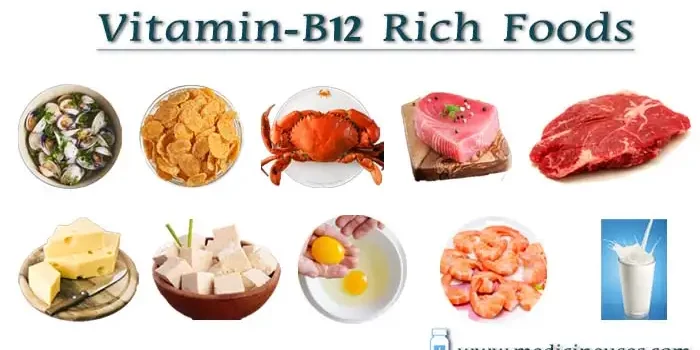
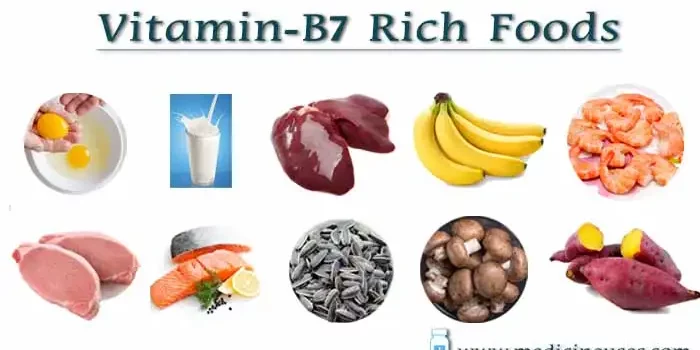
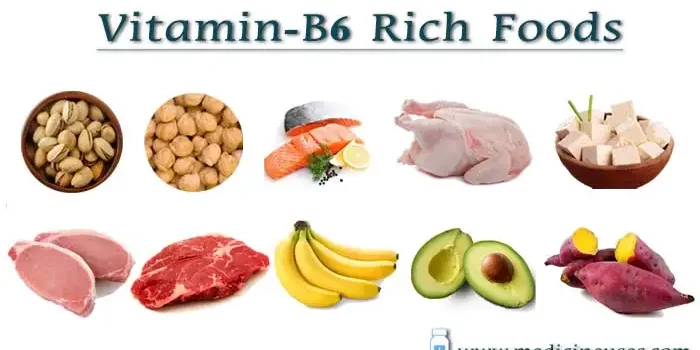
This Post Has 0 Comments